It, therefore, created a stir and drew acclaim in equal measure when Hansal Mehta, known for making critically acclaimed films such as Shahid and Aligarh and the OTT hit Scam 1992, made an X post to say that he had been taking Mounjaro, developed by global pharma major Eli Lilly, under medical supervision to manage his blood sugar. It also made him lose 10 kilos.
“I’m sharing this because there’s unnecessary stigma around these new medications, and people who do use them falsely connect their newfound health to ambiguous and often frustrating fitness regimens. There’s no shame in taking charge of your health with the tools available to you—especially when done responsibly and under supervision," Mehta posted.
He remains a rarity. In India, many users hide the use of weight-loss drugs from family, friends and even doctors, fearing charges of “cheating" or “taking the easy way out". That is muddying the waters in India’s health care landscape, where obesity and diabetes are on the rise and causing an unprecedented surge in the demand for weight-loss drugs. GLP-1 drugs, such as Ozempic, Wegovy, Mounjaro and Zepbound, which were originally developed to manage Type 2 diabetes, offer patients a way to address blood sugar and weight.![]()
But demand for weight-loss drugs has also surged among those chasing—well—weight loss, fuelled by social media, celebrity endorsements and an impatience around traditional efforts like diet and exercise. These treatments provide a clinically backed way to improve health for those struggling with obesity or metabolic conditions. “These medications work by mimicking natural gut hormones, primarily GLP-1, which play a key role in regulating appetite, insulin secretion and gastric emptying. For most patients, the first noticeable change is a significant reduction in appetite and early satiety—meaning they feel full with smaller meals," says Dr Sanjay Agarwal, head of the department of diabetes, obesity and metabolic diseases at Sahyadri Super Speciality Hospital, Pune.
Over time, this leads to a steady reduction in weight. “These drugs are typically administered either via a once-weekly subcutaneous injection or taken orally on a daily basis, depending on the formulation," adds Dr Agarwal.
In a country where body image is linked to marriage prospects, sometimes job opportunities, and social validation, the appeal of a weekly injection is hard to resist—even if it comes with stigma, secrecy, and fears of side effects (do a Google search for ‘Ozempic mouth’ or ‘Ozempic feet’). In this scenario, the promise of a fast, pharmaceutical weight loss is reshaping not just bodies, but also industries and priorities. Which has, almost inevitably, created a billion-dollar race to capture the demand, of which a sizeable portion is off-label, meaning use of a pharmaceutical drugs to treat something different from what it has been approved for.
Race to Shed Pounds
Soaring demand—both for medical necessity and aspirational weight loss—has transformed the pharmaceutical landscape globally.
Novo Nordisk, the maker of Ozempic and Wegovy, reported global sales of nearly $41 billion in 2024, with Wegovy alone generating $8 billion and Ozempic contributing $17 billion. Meanwhile, Eli Lilly’s Mounjaro and Zepbound have seen explosive growth, with Zepbound sales increasing by more than 2,600 percent in 2024 and Mounjaro’s doubling year-over-year. Together, Novo Nordisk and Eli Lilly sold more than $40 billion worth of GLP-1 drugs in 2024, underscoring the global appetite for losing weight fast.
Novo Nordisk, whose Ozempic headlined the rise of weight-loss drugs around the world, plans to introduce Wegovy (injectable Semaglutide 2.4 mg) in India this year. “Ozempic is specifically designed for diabetes treatment, Wegovy is focussed on addressing the needs of patients living with obesity," Vikrant Shrotriya, managing director of Novo Nordisk India, tells Forbes India in an email.
In addition, he says, the company had a pipeline that included “numerous promising candidates" aimed at treating diabetes and obesity. India is quickly catching up. Reports say the market for weight-loss drugs has grown at more than 30 percent compound annual growth rate (CAGR) in the past five years, reaching nearly ₹600 crore ($71.21 million) and is expected to continue growing.
This year, India has officially approved two GLP-1-based drugs for weight loss—Eli Lilly’s Mounjaro and Zepbound. Mounjaro, initially introduced for Type 2 diabetes, has also since received approval for chronic weight management. Zepbound—a higher-dose formulation of the same active ingredient, tirzepatide—is specifically approved for obesity treatment.
Additionally, Novo Nordisk’s Rybelsus—an oral semaglutide—has been approved for diabetes and has seen sales more than double in India, from ₹147 crore in April 2023 to ₹363 crore in April 2024. Though not officially approved for weight loss, its off-label use for obesity is booming, driven by its convenience and growing consumer demand.
These approvals mark a shift in India’s regulatory stance, signalling growing institutional recognition of obesity as a medical condition requiring pharmaceutical intervention.
“Worldwide, over a billion people are living with obesity, and about 70 percent of them live in low- and middle-income countries. To ensure that people in resource-poor countries aren’t left behind, companies that manufacture GLP-1s need to start planning for better access early on, so the treatments are both available and affordable," says Claudia Martinez, director of research, Access to Medicine Foundation.
Indian Firms Step In
Mounjaro is priced around ₹14,000 per month in India (approximately $170), significantly lower than in the US, where it can cost over $1,000 monthly. The price may be lower in India, but the drugs—given purchasing power parity—remain unaffordable for many. However, with key patents on drugs such as semaglutide expected to expire in India around 2026, that might change.
![]() Meantime, Indian pharma companies are positioning themselves to meet the rising demand for more affordable weight-loss treatments. Biocon has already launched liraglutide in the United Kingdom and is building a portfolio that includes semaglutide and tirzepatide, with Group CEO Peter Bains calling GLP-1s a major growth driver.
Meantime, Indian pharma companies are positioning themselves to meet the rising demand for more affordable weight-loss treatments. Biocon has already launched liraglutide in the United Kingdom and is building a portfolio that includes semaglutide and tirzepatide, with Group CEO Peter Bains calling GLP-1s a major growth driver.
Mankind Pharma has completed Phase I clinical trials for GPR119 agonist, the company’s first internally developed New Chemical Entity designed to address obesity and diabetic and metabolic disorders. By the end of FY25, they are looking to move the molecule into Phase 2 clinical trials.
Cipla is gearing up to introduce GLP-1 drugs for India, the US and other emerging markets. Sun Pharma’s GL0034 (Utreglutide) has already shown significant weight loss and improvements in glucose metabolism and lipid levels in obese patients. “We have made long-term investments in drugs like GL0034 designed to treat Type 2 diabetes and obesity. When it is launched, it could potentially change the complexion of the company," Dilip Shanghvi, chairman and managing director of Sun Pharma, told Forbes India in a recent interview. The company is aiming to launch the drug within five years.
How does Novo Nordisk plan to compete with generic semaglutide once patents expire? “Patent expiry is a natural phase in the lifecycle of pharmaceutical products. Despite this, there continues to be a significant unmet need for effective therapies for Type 2 diabetes and obesity—both in expanding access to existing treatments and developing innovative solutions. The market potential remains strong, and we are actively advancing newer molecules and combination therapies to provide multiple treatment options for patients," said Shrotriya.
Regulation and Malpractice
Originally developed for Type 2 diabetes management, GLP-1 agonists are increasingly being used off-label for weight loss—often without proper medical supervision.
According to reports, Indian clinics have been seeing a spike in off-label requests—even from individuals who are not clinically obese. “A lot of patients have been coming to doctors, twisting their arm to prescribe these medicines for them. This is a serious ethical dilemma for the practising doctor," says Dr Sanjay Khare-visiting chief and senior consultant, internal medicine, and director—bariatric medicine at Apollo Hospitals, Navi Mumbai.
![]() There have also been reports of illegal access and misuse. “Driven by high demand and limited supply, unauthorised online sellers have been found distributing counterfeit or substandard GLP-1 agonists. Such practices pose significant health risks to consumers," says Kalpana Gupta Shekhawat, functional and metabolic medicine specialist.
There have also been reports of illegal access and misuse. “Driven by high demand and limited supply, unauthorised online sellers have been found distributing counterfeit or substandard GLP-1 agonists. Such practices pose significant health risks to consumers," says Kalpana Gupta Shekhawat, functional and metabolic medicine specialist.
Some clinics are reportedly promoting GLP-1 agonists for weight loss outside their approved medical use, often without proper patient evaluation. “Certain fitness centres have also been implicated in pushing these drugs as effortless, quick-fix solutions, bypassing the need for individualised health assessments or professional oversight," adds Gupta Shekhawat.
In India, weight-loss drugs—particularly those repurposed from diabetes care—are strictly overseen by the Central Drugs Standard Control Organization. They are classified as prescription-only medicines, restricted to trained medical practitioners—ideally endocrinologists or obesity specialists.
![]()
To ensure responsible prescribing, national medical societies such as RSSDI (Research Society for the Study of Diabetes in India), the Endocrine Society of India, and the Association of Physicians of India have established clinical guidelines and consensus statements. “Ethical prescribing requires strict adherence to DCGI-approved indications (BMI ≥30, or ≥27 with comorbidities). Ongoing clinical monitoring—including parameters like HbA1c and liver function—and continuous physician training are critical to identify and manage potential adverse effects. These are not lifestyle enhancers they are serious medical therapies requiring careful, evidence-based use," says Dr Anoop Misra, chairman of Fortis C-DOC for Diabetes and Allied Sciences.
Additionally, physicians must also conduct thorough pre-prescription assessments, including evaluating body mass index, waist circumference, glycemic control, cardiovascular risk, and ruling out contraindications such as a history of pancreatitis, thyroid malignancies, or severe gastrointestinal disease, says Dr Agarwal of RSSDI.
![]()
Future and Fears
Older drugs like orlistat worked by reducing fat absorption or suppressing appetite, but they often fell short in the long term, plagued by side effects like heart problems and digestive issues.
The latest generation of medication has shown greater promise, and as demand continues to rise, pharmaceutical research is advancing rapidly. New therapies are being developed to enhance efficacy—combining multiple hormone effects for even better results.
![]() “Therapies like CagriSema, a semaglutide-amylin, being developed by Novo Nordisk, could offer even more powerful appetite suppression and a weight reduction of 20 to 25 percent," says Dr Misra of Fortis.
“Therapies like CagriSema, a semaglutide-amylin, being developed by Novo Nordisk, could offer even more powerful appetite suppression and a weight reduction of 20 to 25 percent," says Dr Misra of Fortis.
Yet, the rapid innovation comes with trade-offs. These drugs were originally developed to manage Type 2 diabetes, but as their weight-loss effects became apparent—and more profitable—pharmaceutical giants began shifting their focus almost entirely toward obesity treatments. The reason: Obesity is the more lucrative market. With global demand for GLP-1 drugs skyrocketing, companies are prioritising production and research for weight loss over diabetes care. Novo Nordisk, for instance, recently announced it would be phasing out production of human insulin pens to focus on manufacturing these drugs.
Shrotriya says the company is not discontinuing Mixtard in India and will continue supplying it in vial form alongside other human insulins, including Actrapid and Insulatard. Additionally, the company remains committed to providing modern and next-generation insulins in all available formats. “As part of a global portfolio consolidation, human insulin in Penfill and FlexPen will be phased out in India by the end of this year. We have streamlined our insulin offerings by discontinuing HI Penfills while ensuring uninterrupted access to comprehensive diabetes care solutions," he says. To minimise disruption, Novo Nordisk is engaging with health authorities, health care professionals, trade partners and patients.
“As the demand for GLP-1 medications continues to rise, it’s crucial that pharma companies don’t lose sight of the need to continue to invest in and develop affordable, accessible treatments for other critical diseases, especially those that hit the poorest countries hardest," says Martinez of Access to Medicine Foundation.
Supervision remains key. “Research shows that the new weight-loss drugs are not sustainable in the long term. Nearly two out of three individuals stop taking them within 12 months due to side effects, cost and lack of efficacy. And after stopping, people regain the lost weight," says Dr Vanita Rahman, an internal medicine and lifestyle physician with the Physicians Committee for Responsible Medicine.
Mehta acknowledged that the medication alone was not enough. He incorporated high-protein meals, minimal sugar and alcohol, regular strength training, proper hydration, and intermittent fasting into his routine.


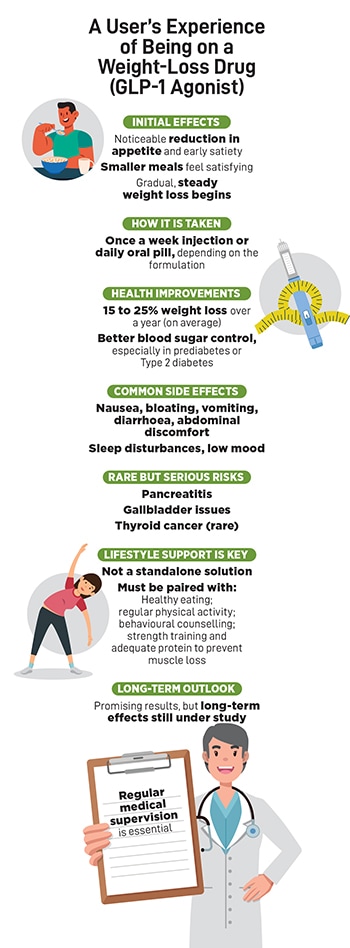 Meantime, Indian pharma companies are positioning themselves to meet the rising demand for more affordable weight-loss treatments. Biocon has already launched liraglutide in the United Kingdom and is building a portfolio that includes semaglutide and tirzepatide, with Group CEO Peter Bains calling GLP-1s a major growth driver.
Meantime, Indian pharma companies are positioning themselves to meet the rising demand for more affordable weight-loss treatments. Biocon has already launched liraglutide in the United Kingdom and is building a portfolio that includes semaglutide and tirzepatide, with Group CEO Peter Bains calling GLP-1s a major growth driver.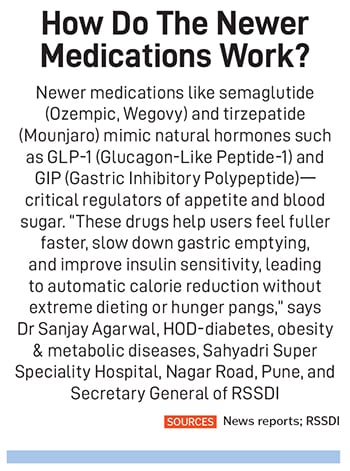 There have also been reports of illegal access and misuse. “Driven by high demand and limited supply, unauthorised online sellers have been found distributing counterfeit or substandard GLP-1 agonists. Such practices pose significant health risks to consumers," says Kalpana Gupta Shekhawat, functional and metabolic medicine specialist.
There have also been reports of illegal access and misuse. “Driven by high demand and limited supply, unauthorised online sellers have been found distributing counterfeit or substandard GLP-1 agonists. Such practices pose significant health risks to consumers," says Kalpana Gupta Shekhawat, functional and metabolic medicine specialist.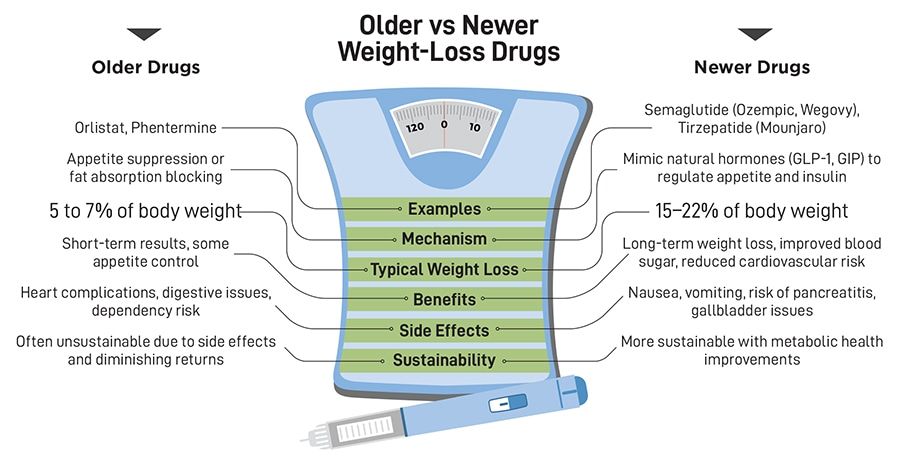
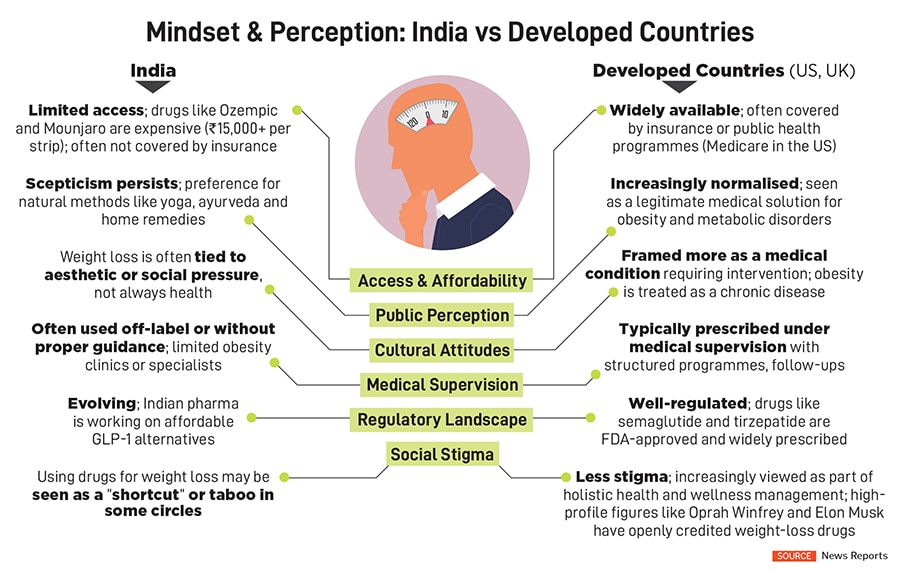
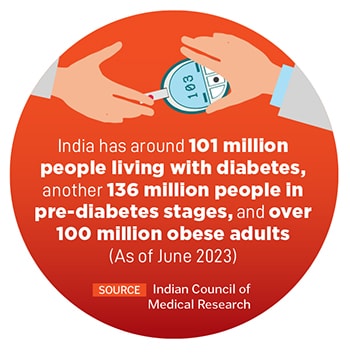 “Therapies like CagriSema, a semaglutide-amylin, being developed by Novo Nordisk, could offer even more powerful appetite suppression and a weight reduction of 20 to 25 percent," says Dr Misra of Fortis.
“Therapies like CagriSema, a semaglutide-amylin, being developed by Novo Nordisk, could offer even more powerful appetite suppression and a weight reduction of 20 to 25 percent," says Dr Misra of Fortis.